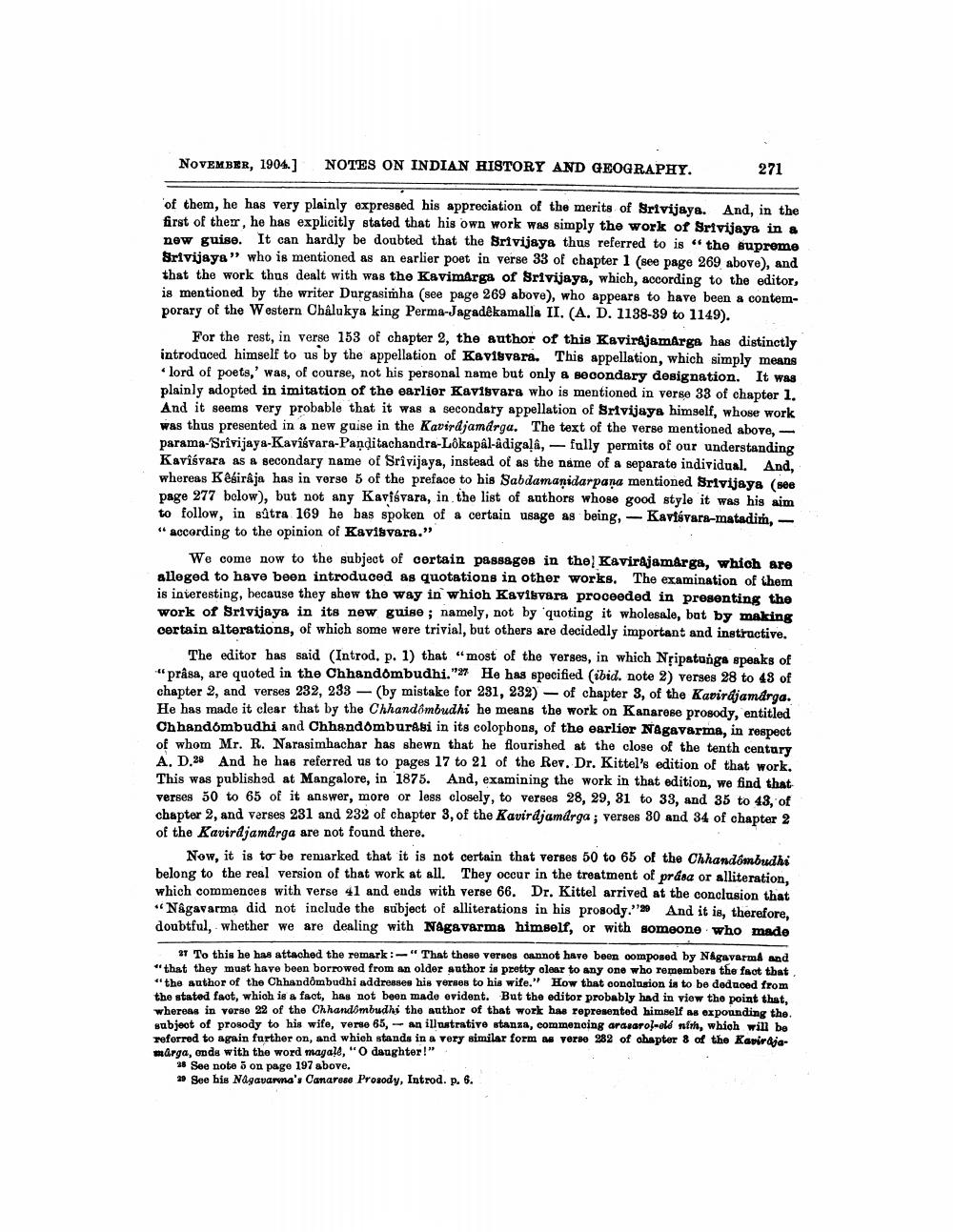________________
NOVEMBER, 1904.]
NOTES ON INDIAN HISTORY AND GEOGRAPHY.
271
of them, he has very plainly expressed his appreciation of the merits of Srivijaya. And, in the first of ther, he has explicitly stated that his own work was simply the work of Srivijaya in a new guise. It can hardly be doubted that the Srivijaya thus referred to is "the supreme Srivijaya" who is mentioned as an earlier poet in verse 33 of chapter 1 (see page 269 above), and that the work thus dealt with was the Kavimarga of Srivijaya, which, according to the editor, is mentioned by the writer Dargasimha (see page 269 above), who appears to have been a contemporary of the Western Chalukya king Perma-Jagadêkamalla II. (A. D. 1138-89 to 1149).
For the rest, in verse 153 of chapter 2, the author of this Kavirajamarga has distinctly introduced himself to us by the appellation of Kavisvara. This appellation, which simply means
lord of poets,' was, of course, not his personal name but only a secondary designation. It was plainly adopted in imitation of the earlier Kavisvara who is mentioned in verse 33 of chapter 1. And it seems very probable that it was a secondary appellation of Srivijaya himself, whose work was thus presented in a new guise in the Kavirajamarga. The text of the verse mentioned above, parama-Srivijaya-Kavisvara-Panditachandra-Lôkapal-adiga!â, - fully permits of our understanding Kaviśvara as a secondary name of Srivijaya, instead of as the name of a separate individual. And. whereas Kesiraja has in verse 5 of the preface to his Sabdamanidarpaņa mentioned Srivijaya (see page 277 below), but not any Kavisvara, in the list of authors whose good style it was his aim to follow, in satra 169 he bas spoken of a certain usage as being, - Kaviávara-matadim, "according to the opinion of Kavisvara."
We come now to the subject of certain passages in the Kavirajamarga, which are alleged to have been introduced as quotations in other works. The examination of them is interesting, because they shew the way in which Kavibvara proceeded in presenting the work of Srivijaya in its new guise ; namely, not by 'quoting it wholesale, bat by making certain alterations, of which some were trivial, but others are decidedly important and instructive.
The editor has said (Introd. p. 1) that “most of the verses, in which Nripatunga speaks of - prasa, are quoted in the Chhandombudhi."27 He has specified (ibid. note 2) verses 28 to 48 of chapter 2, and verses 232, 233 - (by mistake for 231, 232) - of chapter 3, of the Kavirajamarga. He has made it clear that by the Chhandômbudhi he means the work on Kanarese prosody, entitled Chhandombudhi and Chhandomburasi in its colopbons, of the earlier Nagavarma, in respect of whom Mr. R. Narasimhachar has shewn that he flourished at the close of the tenth century A. D.28 And he has referred us to pages 17 to 21 of the Rev. Dr. Kittel's edition of that work. This was published at Mangalore, in 1875. And, examining the work in that edition, we find that verses 50 to 65 of it answer, more or less closely, to verses 28, 29, 31 to 33, and 35 to 43, of chapter 2, and verses 231 and 232 of chapter 3, of the Kavirdjamdrga ; verses 30 and 34 of chapter 2 of the Kavirdjamarga are not found there.
Now, it is to be remarked that it is not certain that verses 50 to 65 of the Chhandômbudhi belong to the real version of that work at all. They occur in the treatment of práoa or alliteration, which commences with verse 41 and ends with verse 66. Dr. Kittel arrived at the conclusion that
Någavarma did not include the subject of alliterations in his prosody."29 And it is, therefore, doubtful, whether we are dealing with Nagavarma himself, or with someone who made
31 To this he has attached the remark:-"That these verses cannot have been composed by Nagavarms and that they must have been borrowed from an older author is pretty olear to any one who remembers the fact that "the author of the Chhandômbudhi addresses his verses to his wife." How that conclusion is to be deduced from the stated fact, which is a fact, has not been made evident. But the editor probably had in view the point that. whereas in vorso 22 of the Chhandômbudhi the author of that work has represented himself as oxpounding the subjeot of prosody to his wife, verso 65,- an illustrative stanza, commencing araiarol-old nofth, which will be reforred to again further on, and which stands in a very similar form a verse 982 of chapter 8 of the Kapir djamarga, onde with the word magale, "O daughter!"
** See note on page 197 above. ** See his Nagavarma's Canarese Prosody, Introd. p. 6.




